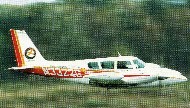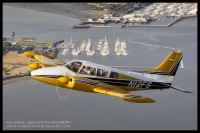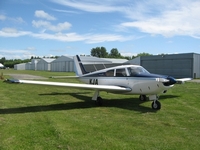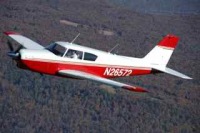Hi All,
Where is it recommended to install the oxy tank for a MH O2D2 system? I guess it will depend on what size tank I choose but are there any recommendations out there?
Also, are any approvals required given that it would be a portable system?
Cheers,
James.
Mountain High Oxy
16 posts
• Page 1 of 2 • 1, 2
Re: Mountain High Oxy
As long as it's a portable system, no approval is necessary, so if by "install" you mean tying it down in the baggage compartment, then no problem. On the other hand if by "install" you mean bolting it into the tail cone behind the baggage compartment and running lines up to the seats as a more or less permanent installation, then you'll likely need some kind of approval. My own O2 system was installed in in the tail on a field approval basis. Your I/A should be able to give you guidance on this.
Jay
Jay
Jay
PA 30 N7702Y
PA 30 N7702Y
-

Jay - ICS member

- Posts: 473
- Joined: Tue Sep 30, 2003 10:59 pm
- Location: Portland, Oregon
Re: Mountain High Oxy
James,
We strap ours in between the rear seats. Works for us as we generally only have 2 on board
We strap ours in between the rear seats. Works for us as we generally only have 2 on board
Pat
Patricia Jayne (Pat) Keefer ICS 08899
PA-39 #10 Texas
Patricia Jayne (Pat) Keefer ICS 08899
PA-39 #10 Texas
-

N3322G - ICS member

- Posts: 1911
- Joined: Thu May 08, 2008 1:58 pm
- Location: Fort Worth, Texas area
Re: Mountain High Oxy
I likewise have no idea whether you're talking portable vs installed, so here's my experiences with both.
Current '66 30B Turbo: Assumed factory installation, is behind the aft/baggage bulkhead, mid level on left side.
Last '62 250: Portable, in a carry container, usually laid on floor behind front seats. Valve and connections were accessible between the seats. If 3 souls aboard, would stand it up behind pilot seat, still in carry container. If 4 souls aboard, it would have to, w/o carry container, go under the co-pilot seat, sticking out some between his/her legs.
First, (also first aircraft), a '60 250, it was an after market installation hung at top of baggage compartment against the left side.
The portable served me in many aircraft, in between those 250's, with never a problem finding a fit.
Best, Don
Current '66 30B Turbo: Assumed factory installation, is behind the aft/baggage bulkhead, mid level on left side.
Last '62 250: Portable, in a carry container, usually laid on floor behind front seats. Valve and connections were accessible between the seats. If 3 souls aboard, would stand it up behind pilot seat, still in carry container. If 4 souls aboard, it would have to, w/o carry container, go under the co-pilot seat, sticking out some between his/her legs.
First, (also first aircraft), a '60 250, it was an after market installation hung at top of baggage compartment against the left side.
The portable served me in many aircraft, in between those 250's, with never a problem finding a fit.
Best, Don
-

Don Nelson - ICS member

- Posts: 312
- Joined: Mon Nov 10, 2003 5:57 pm
- Location: Burlington, Washington; KBVS
Re: Mountain High Oxy
Thanks for your replies.
Sorry for the confusion. I was actually talking about a protable system but the information about the 'installed' system is very helpful also.
Regards,
James.
Sorry for the confusion. I was actually talking about a protable system but the information about the 'installed' system is very helpful also.
Regards,
James.
-

James Turner - Posts: 102
- Joined: Wed Nov 30, 2011 5:20 am
Re: Mountain High Oxy
I've never used O2 because most of our flying has been in the 6-8,000ft range. What would be a reasonable size portable cylinder for two people that usually do all our flying in the eastern 1/2 of the country? Most of the systems I see are in the $4-500 range, so I guess maybe weight and repeat fillings would be the point of my question. My thoughts are to use it at night and longer legs at 8 or above.
Thanks,
Steve
Thanks,
Steve
-

Steve Marcozzi - ICS member

- Posts: 47
- Joined: Sat Apr 02, 2005 2:50 am
- Location: Frankfort, KY
Re: Mountain High Oxy
Steve,
I wouldn't get anything less than 22 CF. I have the Aerox system with oxy saving cannulas with a 22. It never seems to last as long as it should. With four people using it somewhere between 12-15 k feet it would be empty. The problem I find on trips is getting it refilled at your destination. Even if it is an airport that has the service it is a hassle coordinating it. It's been my experience most places charge the same to fill no matter the size of the bottle or how much it needs. My local airport charges $25. Another reason to err on the large side. In my opinion these systems are good for short spurts getting over terrain or on the rare occasion you can get over the weather. I rarely carry mine any more just because of the room they take up and hoses running everywhere. Also hard to good the kids to where it.
Mark
I wouldn't get anything less than 22 CF. I have the Aerox system with oxy saving cannulas with a 22. It never seems to last as long as it should. With four people using it somewhere between 12-15 k feet it would be empty. The problem I find on trips is getting it refilled at your destination. Even if it is an airport that has the service it is a hassle coordinating it. It's been my experience most places charge the same to fill no matter the size of the bottle or how much it needs. My local airport charges $25. Another reason to err on the large side. In my opinion these systems are good for short spurts getting over terrain or on the rare occasion you can get over the weather. I rarely carry mine any more just because of the room they take up and hoses running everywhere. Also hard to good the kids to where it.
Mark
-

Mark Anderson - ICS member

- Posts: 196
- Joined: Sat Aug 29, 2009 12:24 am
- Location: Huntsville , AL
Re: Mountain High Oxy
My boss has one in his Bo-nan-za and gets a perscription from his doc to get it filled at a medical supply place. Gonna check out what he's up to as well....
I usually try to stay away from anything with 1/3 of the tail missing.
Thanks,
Steve
I usually try to stay away from anything with 1/3 of the tail missing.
Thanks,
Steve
-

Steve Marcozzi - ICS member

- Posts: 47
- Joined: Sat Apr 02, 2005 2:50 am
- Location: Frankfort, KY
-

Mark Anderson - ICS member

- Posts: 196
- Joined: Sat Aug 29, 2009 12:24 am
- Location: Huntsville , AL
Re: Mountain High Oxy
Looks good.....will read & digest.
Thx,
Steve
Thx,
Steve
-

Steve Marcozzi - ICS member

- Posts: 47
- Joined: Sat Apr 02, 2005 2:50 am
- Location: Frankfort, KY
Re: Mountain High Oxy
Dear Mark,
I was wondering if you are setting up your flow properly when you say that you are using up all the oxygen fairly rapidly. If you look at the flow meter on the Aerox portable system, there are two scales on it. One scale is for a face mask and the other is for the oxysaver. If you are using oxysavers and use the scale for the face mask, you will suck up oxygen (waste most of it) at a rapid pace. You need to look carefully at the flow meters. That is a little glass/plastic tube with a ball that rides on the oxygen flowing through it when held vertical. I think a full 22 cu/ft tank should last 4 people 6 hours and one person 25 hours at 15,000 feet if set up properly. A lot more hours at 8000 feet. I'm pretty sure the tank I use is a 13 cu/ft tank. It works fine for two people.
I think medical oxygen has some small amount of moisture (water vapor) in it. Although that makes the breathing of oxygen more comfortable, it tends to have the chance of freezing at the valve where the high pressure turns to low pressure (sometimes called the expansion valve). This is a principle used in air conditioning. That is also why most built in systems have an oxygen heater so that this freeze up won't occur, especially if the tank is in the tail section where it is exposed to lower non-heated temperatures. This valve freezing up has probably been the cause of many accidents over the years, but can't be proved because by the time the investigation takes place, the valve is defrosted and appears normal. Kind of like carb ice. At any rate, if you use a portable system and keep it in the passenger compartment (where it is relatively warm) this freeze up is less likely to occur. Also by not using medical oxygen, you are probably getting oxygen with little to no moisture content and that much reduces the chance of freezing the valve. Of course breathing dry oxygen is a little coarser on your throat and inside your nose and bringing along some water to drink occasionally will help at least with your throat.
Sincerely,
Skip Dykema
I was wondering if you are setting up your flow properly when you say that you are using up all the oxygen fairly rapidly. If you look at the flow meter on the Aerox portable system, there are two scales on it. One scale is for a face mask and the other is for the oxysaver. If you are using oxysavers and use the scale for the face mask, you will suck up oxygen (waste most of it) at a rapid pace. You need to look carefully at the flow meters. That is a little glass/plastic tube with a ball that rides on the oxygen flowing through it when held vertical. I think a full 22 cu/ft tank should last 4 people 6 hours and one person 25 hours at 15,000 feet if set up properly. A lot more hours at 8000 feet. I'm pretty sure the tank I use is a 13 cu/ft tank. It works fine for two people.
I think medical oxygen has some small amount of moisture (water vapor) in it. Although that makes the breathing of oxygen more comfortable, it tends to have the chance of freezing at the valve where the high pressure turns to low pressure (sometimes called the expansion valve). This is a principle used in air conditioning. That is also why most built in systems have an oxygen heater so that this freeze up won't occur, especially if the tank is in the tail section where it is exposed to lower non-heated temperatures. This valve freezing up has probably been the cause of many accidents over the years, but can't be proved because by the time the investigation takes place, the valve is defrosted and appears normal. Kind of like carb ice. At any rate, if you use a portable system and keep it in the passenger compartment (where it is relatively warm) this freeze up is less likely to occur. Also by not using medical oxygen, you are probably getting oxygen with little to no moisture content and that much reduces the chance of freezing the valve. Of course breathing dry oxygen is a little coarser on your throat and inside your nose and bringing along some water to drink occasionally will help at least with your throat.
Sincerely,
Skip Dykema
Skip Dykema, ICS #3062
Comanche 180, Commercial-Instrument, SEL, MEL, A&P
Comanche 180, Commercial-Instrument, SEL, MEL, A&P
- skipsouthernsky
- Past President

- Posts: 235
- Joined: Sun May 11, 2003 7:40 pm
- Location: Davie, Florida (Ft. Lauderdale)
Re: Mountain High Oxy
The only way to really tell if you are getting enough O2 is to buy and use a pulse oximeter. Little gadget that fits over a finger tip and measures your percent O2 saturation in the blood. At one time they ran several hundred dollars each, but are now relatively cheap (I've seen them for less than $30) and available on line. You check your O2 saturation and then adjust flow as needed to keep it in the mid 90's. I've found that different people have completely different needs. My father was a long time smoker, I needed to put everything I could through his cannula to keep his sat above 88%. On the same flight I was operating at the low end of the flow scale to maintain 96-97%
As to medical versus welding versus aviation oxygen, once upon a time they were different, but it's all the same now and has been for many years. The process used by the basic suppliers eliminates moisture to minimize corrosion in their systems. Hospitals now have to add moisture back to their O2. The only difference is what the end user gets charged.
Jay
As to medical versus welding versus aviation oxygen, once upon a time they were different, but it's all the same now and has been for many years. The process used by the basic suppliers eliminates moisture to minimize corrosion in their systems. Hospitals now have to add moisture back to their O2. The only difference is what the end user gets charged.
Jay
Jay
PA 30 N7702Y
PA 30 N7702Y
-

Jay - ICS member

- Posts: 473
- Joined: Tue Sep 30, 2003 10:59 pm
- Location: Portland, Oregon
Re: Mountain High Oxy
Skip, thanks for the information. That could quite possibly be the cause. I will check out the gauge next time I am at the hanger. I definitely think that if O2 was more readily available that it would improve the saftey of GA flying, especially at night. After spending 4 hours at 12,000 feet with no supplemental O2, I can tell that I am not as sharp. Depending on the amount of flying you do, it may pay to invest in a cascade system as this article suggest. Jay, good advice on the pulse oximeter. I bought one at Wal Greens for around $30.
Thanks
Mark
Thanks
Mark
-

Mark Anderson - ICS member

- Posts: 196
- Joined: Sat Aug 29, 2009 12:24 am
- Location: Huntsville , AL
Re: Mountain High Oxy
And remember, if the passengers are annoying you, just turn THEIR O2 down until they go nite nite....
Just kidding. Sorta.
Jay
Just kidding. Sorta.
Jay
Jay
PA 30 N7702Y
PA 30 N7702Y
-

Jay - ICS member

- Posts: 473
- Joined: Tue Sep 30, 2003 10:59 pm
- Location: Portland, Oregon
Re: Mountain High Oxy
Dear Mark,
I agree that oxygen is very helpful for serious flying. Much time at altitude (above 10 or 11,000) tends to take its toll on your mental sharpness. It also tends to leave you more tired at the end of a long flight. The oxygen helps a lot in that respect.
The other big plus is that the higher altitudes allow you to overfly much of the weather that can be problematic at 5 to 10,000. You get better fuel burn and can sometimes take advantage of great tailwinds. There are a lot of pluses up in the oxygen altitudes between 12 and 18,000 feet. Also you are not high enough so that if a problem develops with your oxygen supply that most healthy pilots won't totally loose consciousness. Now getting up into the 20 to 25,000 ft. turbo range holds a lot more danger if the oxygen supply gives out for one reason or another. At those altitudes the loss of oxygen can be pretty stealthy and insidious. It has fooled and killed many experienced pilots along with their passengers.
At any rate, if done right, oxygen can be an economical and very useful tool to have in your bag of tricks.
Sincerely,
Skip Dykema
I agree that oxygen is very helpful for serious flying. Much time at altitude (above 10 or 11,000) tends to take its toll on your mental sharpness. It also tends to leave you more tired at the end of a long flight. The oxygen helps a lot in that respect.
The other big plus is that the higher altitudes allow you to overfly much of the weather that can be problematic at 5 to 10,000. You get better fuel burn and can sometimes take advantage of great tailwinds. There are a lot of pluses up in the oxygen altitudes between 12 and 18,000 feet. Also you are not high enough so that if a problem develops with your oxygen supply that most healthy pilots won't totally loose consciousness. Now getting up into the 20 to 25,000 ft. turbo range holds a lot more danger if the oxygen supply gives out for one reason or another. At those altitudes the loss of oxygen can be pretty stealthy and insidious. It has fooled and killed many experienced pilots along with their passengers.
At any rate, if done right, oxygen can be an economical and very useful tool to have in your bag of tricks.
Sincerely,
Skip Dykema
Skip Dykema, ICS #3062
Comanche 180, Commercial-Instrument, SEL, MEL, A&P
Comanche 180, Commercial-Instrument, SEL, MEL, A&P
- skipsouthernsky
- Past President

- Posts: 235
- Joined: Sun May 11, 2003 7:40 pm
- Location: Davie, Florida (Ft. Lauderdale)
16 posts
• Page 1 of 2 • 1, 2
Return to Maintenance - General
Who is online
Users browsing this forum: No registered users and 15 guests
